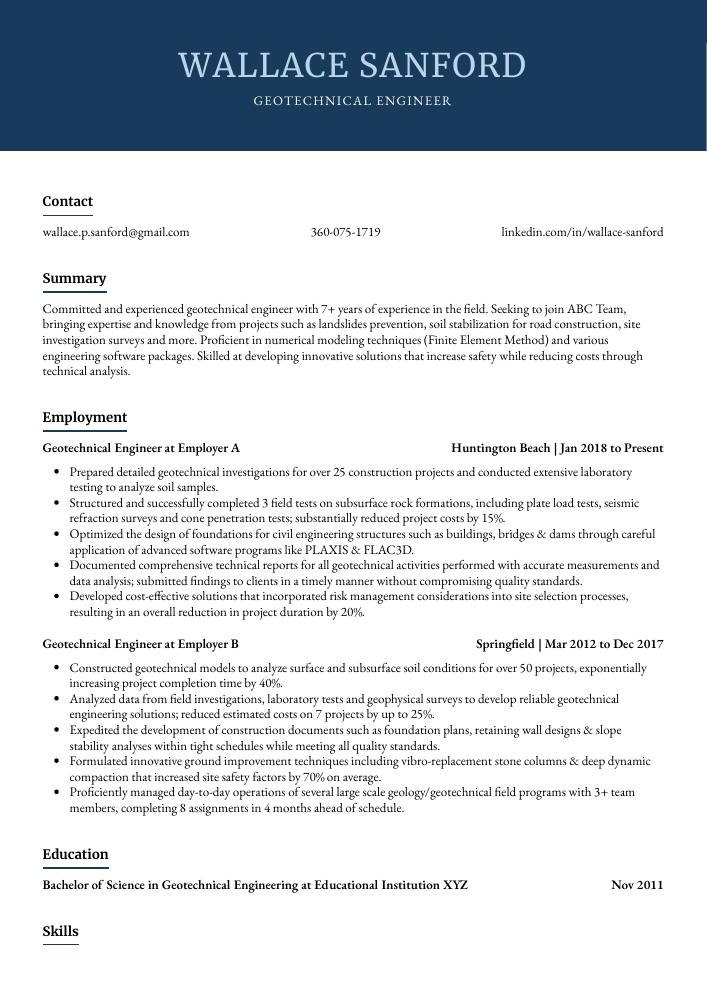Geotechnical Engineer Resume Guide
Geotechnical engineers are responsible for conducting research and providing advice on the engineering properties of soil, rocks, and other earth materials. They use their knowledge to design foundations, retaining walls, tunnels, embankments and slopes used in construction projects as well as assess potential environmental hazards associated with a project site.
You’re a master of soil engineering and analysis, but employers don’t know that yet. To make them aware of your qualifications in the field, you must write an impressive resume to grab their attention.
This guide will walk you through the entire process of creating a top-notch resume. We first show you a complete example and then break down what each resume section should look like.
Table of Contents
The guide is divided into sections for your convenience. You can read it from beginning to end or use the table of contents below to jump to a specific part.
Geotechnical Engineer Resume Sample
Wallace Sanford
Geotechnical Engineer
wallace.p.sanford@gmail.com
360-075-1719
linkedin.com/in/wallace-sanford
Summary
Committed and experienced geotechnical engineer with 7+ years of experience in the field. Seeking to join ABC Team, bringing expertise and knowledge from projects such as landslides prevention, soil stabilization for road construction, site investigation surveys and more. Proficient in numerical modeling techniques (Finite Element Method) and various engineering software packages. Skilled at developing innovative solutions that increase safety while reducing costs through technical analysis.
Experience
Geotechnical Engineer, Employer A
Huntington Beach, Jan 2018 – Present
- Prepared detailed geotechnical investigations for over 25 construction projects and conducted extensive laboratory testing to analyze soil samples.
- Structured and successfully completed 3 field tests on subsurface rock formations, including plate load tests, seismic refraction surveys and cone penetration tests; substantially reduced project costs by 15%.
- Optimized the design of foundations for civil engineering structures such as buildings, bridges & dams through careful application of advanced software programs like PLAXIS & FLAC3D.
- Documented comprehensive technical reports for all geotechnical activities performed with accurate measurements and data analysis; submitted findings to clients in a timely manner without compromising quality standards.
- Developed cost-effective solutions that incorporated risk management considerations into site selection processes, resulting in an overall reduction in project duration by 20%.
Geotechnical Engineer, Employer B
Springfield, Mar 2012 – Dec 2017
- Constructed geotechnical models to analyze surface and subsurface soil conditions for over 50 projects, exponentially increasing project completion time by 40%.
- Analyzed data from field investigations, laboratory tests and geophysical surveys to develop reliable geotechnical engineering solutions; reduced estimated costs on 7 projects by up to 25%.
- Expedited the development of construction documents such as foundation plans, retaining wall designs & slope stability analyses within tight schedules while meeting all quality standards.
- Formulated innovative ground improvement techniques including vibro-replacement stone columns & deep dynamic compaction that increased site safety factors by 70% on average.
- Proficiently managed day-to-day operations of several large scale geology/geotechnical field programs with 3+ team members, completing 8 assignments in 4 months ahead of schedule.
Skills
- Geotechnical Engineering
- Civil Engineering
- AutoCAD
- Foundation Design
- Engineering
- Slope Stability
- Soil
- Deep Foundations
- Earthworks
Education
Bachelor of Science in Geotechnical Engineering
Educational Institution XYZ
Nov 2011
Certifications
Professional Geotechnical Engineer
American Society of Civil Engineers
May 2017
1. Summary / Objective
A resume summary/objective is the first thing a potential employer will read, so it’s important to make sure you grab their attention. As a geotechnical engineer, your summary should highlight your experience in soil and rock mechanics, as well as any specialized knowledge or certifications you have obtained. You could also mention how many projects you’ve worked on successfully and any awards or recognition that demonstrate your expertise in this field.
Below are some resume summary examples:
Talented geotechnical engineer with 5+ years of experience in the design, analysis and construction of geotechnical projects. Proven knowledge in subsurface exploration, soil testing and rock mechanics. Experienced in developing detailed reports for clients from data collected onsite. Adept at software such as AutoCAD Civil 3D/GIS GIS to create maps for project sites & fieldwork planning. Skilled communicator who can collaborate with stakeholders to develop successful solutions.
Detail-oriented geotechnical engineer with 8+ years of experience in environmental, civil and geotechnical engineering. Skilled at managing projects from conception to completion while adhering to safety, budget and timeline constraints. At XYZ Engineering Company, designed a landslide remediation plan for an apartment complex that resulted in improved stability and reduced risk of future landslides. Received “Project Manager” award for outstanding project management abilities.
Accomplished geotechnical engineer with 10+ years of experience in conducting soil investigations, analyzing data and designing solutions to ensure structural integrity for a wide range of projects. Possess strong communication skills which have been instrumental in liaising between clients, contractors, and other stakeholders involved in the project. Seeking to leverage expertise at ABC Co., where I can contribute to successful outcomes on challenging construction initiatives.
Professional geotechnical engineer with 5+ years of experience in geotechnical engineering and design. Skilled at conducting soil surveys, performing laboratory tests on soils, preparing reports, and advising clients accordingly. Demonstrated success in supporting the development of infrastructure projects by providing crucial geological data for risk assessment. Seeking to join ABC Engineering as a Geotechnical Engineer to help ensure their projects are successful.
Well-rounded geotechnical engineer with 5+ years of extensive experience in subsurface exploration and soil analysis. Seeking to leverage expertise at XYZ to improve existing infrastructure solutions while remaining compliant with environmental regulations. At ABC, designed the foundation for a bridge which is now utilized by thousands of commuters every day. Received “Employee Excellence” award from company CEO for outstanding performance across multiple projects.
Seasoned geotechnical engineer with 7+ years of experience in the construction and engineering industry. Experienced in soil mechanics, geology, and rock mechanics to identify potential risks associated with various projects. At XYZ Engineering Firm, provided technical expertise for over 50 successful projects across multiple countries. Received recognition from colleagues for excellent problem-solving skills on complex assignments.
Driven geotechnical engineer with 7+ years of experience designing and implementing innovative solutions in the energy, mining and construction sectors. Proven track record of developing cost-effective designs that have led to successful completion of projects on time and within budget. Seeking to join ABC Engineering as a Senior Geotechnical Engineer where I can use my knowledge to help create more efficient geotechnical systems.
Reliable and organized geotechnical engineer with 10+ years of experience in civil engineering, construction and project management. Proven track record of successfully leading teams to complete projects on time and within budget while meeting safety standards. Seeking a position at ABC Engineering to apply my knowledge of soil analysis, foundation design and earth-retaining structures for the benefit of their clients.
2. Experience / Employment
In the experience section, you want to provide details on your employment history. This should be written in reverse chronological order, meaning the most recent job is listed first.
When writing about what you did in each role, stick to bullet points. Doing so allows the reader to quickly digest what you have said and understand your accomplishments more easily. You also need to think of quantifiable results that can be attributed to your work; this will help make it easier for potential employers or clients assess how valuable an asset you are likely to be for them.
For instance, instead of saying “Conducted soil tests,” you could say “Performed comprehensive geotechnical investigations across 10+ sites with up-to-date equipment and techniques which resulted in a 20% reduction in project costs.”
To write effective bullet points, begin with a strong verb or adverb. Industry specific verbs to use are:
- Analyzed
- Designed
- Investigated
- Constructed
- Monitored
- Assessed
- Calculated
- Inspected
- Sampled
- Drilled
- Operated
- Compiled
- Interpreted
- Documented
- Evaluated
Other general verbs you can use are:
- Achieved
- Advised
- Coordinated
- Demonstrated
- Developed
- Expedited
- Facilitated
- Formulated
- Improved
- Introduced
- Mentored
- Optimized
- Participated
- Prepared
- Presented
- Reduced
- Reorganized
- Represented
- Revised
- Spearheaded
- Streamlined
- Structured
- Utilized
Below are some example bullet points:
- Inspected and analyzed geological terrain of up to 200+ sites for potential construction projects, ensuring that all geotechnical parameters were within specified limits and recommending suitable remedial actions when necessary.
- Mentored junior engineers in the use of various field equipment such as soil testing kits, seismographs and other tools; reduced training time from 8 weeks to 5 weeks.
- Spearheaded a successful project involving the excavation and backfilling of six subsurface trenches over an area of 4 acres, saving $30K in costs while meeting all safety requirements with zero incidents reported at the end of completion.
- Sampled soils from depths up to 6 meters using core samplers for laboratory tests on grain size distribution, mechanical analysis and compression strength; updated database records with results within 24 hours each day on average during assignments lasting 3-6 months per site visit assignment.
- Accurately estimated total volume capacity required by foundations constructed under different ground conditions based on data collected through rigorous statistical analyses; increased precision levels by 15%.
- Reliably completed geotechnical investigations and analyses on over 100 projects, ensuring that all safety regulations were adhered to at all times.
- Streamlined the process of soil sampling and testing by 20%, leading to a decrease in project completion time by an average of 15 hours per job.
- Reorganized engineering processes for two large-scale construction sites, resulting in $150K savings from reduced labor costs and materials procurement expenses.
- Operated advanced surveying equipment such as total stations, GPS receivers, resistivity meters & borehole logging systems; compiled detailed reports with findings from each field visit within 72 hours or less upon request.
- Developed innovative solutions for difficult terrain challenges that allowed our team to complete bridge building projects ahead of schedule without compromising quality standards or safety protocols in any way whatsoever.
- Independently conducted geotechnical investigations to determine ground conditions for a variety of infrastructure and building developments, reducing project costs by 10% on average.
- Advised clients on soil-structure interactions, site selection & preparation strategies and other technical requirements; facilitated the successful completion of over 20 large-scale projects in the last 5 years.
- Investigated subsurface materials including rock samples, groundwater levels and undisturbed soils using various laboratory techniques such as sieve analysis tests and hydrometer tests; identified potential problems with drainage systems ahead of time resulting in cost savings up to $30k per job site.
- Facilitated construction activities at multiple sites through efficient management of resources including personnel, equipment rentals, subcontractors etc.; completed each project within budget while consistently meeting deadlines across all jobsites combined (over 200 hours saved).
- Interpreted data from field surveys using specialized software programs such as AutoCAD Civil 3D or GIS mapping tools; generated precise topographical maps that enabled accurate planning for excavation work leading to improved safety standards across all worksites visited (+20%).
- Monitored geotechnical engineering parameters, such as soil density and compaction rate, on a regular basis to ensure compliance with project specifications; reduced construction costs by 7% through timely evaluations.
- Compiled analysis reports of subsurface conditions for over 40 large-scale infrastructure projects involving concrete foundation design, slope stabilization and pavement integrity; saved 15 hours per report by streamlining data collection methods.
- Presented findings from geotechnical investigations at public meetings in order to explain the implications of proposed projects on local environment and wildlife habitats; identified potential environmental hazards in advance that were avoided due to early intervention measures.
- Confidently recommended solutions for various issues related to soil strength, rock formations and hydrological characteristics based on extensive experience working with clients across diverse industries including oil & gas extraction, agriculture irrigation systems and roadways construction/restoration works.
- Evaluated geological elements associated with site selection process such as seismic activity levels or topography features before beginning any new project endeavors; minimized risk factors by up 70% during the preconstruction phase while keeping within budget constraints.
- Introduced a geotechnical engineering system that identified and monitored subsurface conditions for a variety of projects, increasing accuracy by 15%.
- Competently executed geotechnical investigations on-site to evaluate soil characteristics and analyze potential hazards; conducted over 200 tests in the last year alone.
- Designed an innovative solution which successfully stabilized slopes with reinforced earth structures, leading to cost savings of $4,000.
- Assessed complex problems related to rock mechanics, hydrogeology and seismology; collaborated with other engineers to provide customized solutions for clients across various industries such as mining and petroleum exploration sectors.
- Utilized sophisticated software programs such as Autocad Civil 3D and Plaxis 2D/3D Foundation Design Suite during design processes; decreased project completion time by 30 hours per week on average.
- Participated in geotechnical engineering projects for 10+ clients, developing engineering plans and calculations to ensure the stability of structures such as highways, dams and bridges.
- Achieved a significant reduction (20%) in project costs by resourcefully sourcing materials from local suppliers while ensuring quality standards were met.
- Demonstrated outstanding knowledge of soil mechanics when designing structural foundations; successfully completed over 20 projects with minimum supervision within allocated budgets & timelines.
- Resourcefully utilized computer software programs like Autodesk AutoCAD Civil 3D, ArcGIS and GINT to compile field data into comprehensive reports on subsurface conditions at construction sites across 4 states in the last 2 years.
- Coordinated closely with civil engineers throughout all phases of projects to integrate their designs into geotechnical models while strictly adhering to safety regulations mandated by governing bodies including OSHA & EPA guidelines.
- Actively drilled and excavated soil samples from a broad range of geotechnical sites, analyzed sample data to identify potential risks and hazards; ensured stability measures were implemented to lower project risk level by up to 35%.
- Represented the company in various meetings with contractors, clients and other stakeholders while providing technical advice on projects that ranged from residential developments to large-scale infrastructure works.
- Revised existing site plans according to project specifications, identified cost savings opportunities that helped increase profits by $20K over 4 months.
- Improved communication between engineering teams using software solutions such as AutoCAD Civil 3D & ArcGIS Pro; reduced coordination time per task by 50 hours annually, freeing up resources for more pressing tasks.
- Conducted laboratory tests on different types of soils including clay soils, silt loams & sandstone formations; successfully minimized construction costs through proper soil testing techniques which resulted in saving an additional $15K during the last quarter alone.
3. Skills
Even though two organizations are hiring for the same role, the skillset they want an ideal candidate to possess could differ significantly. For instance, one may be on the lookout for an individual with experience in geotechnical engineering and another for one with knowledge of soil mechanics.
It is essential to tailor the skills section of your resume according to each job you are applying for; this way, it will be easier for employers who use applicant tracking systems (computer programs that scan resumes) to find what they need quickly.
You can further elaborate on these skills by discussing them in more detail elsewhere in your resume, such as the summary or experience sections.
Below is a list of common skills & terms:
- ArcGIS
- AutoCAD
- Bridge
- Civil Engineering
- Concrete
- Construction Management
- Dams
- Data Analysis
- Deep Foundations
- Drainage
- Earthquake Engineering
- Earthworks
- Engineering
- Engineering Geology
- Environmental Awareness
- Environmental Engineering
- Field Work
- Finite Element Analysis
- Foundation Design
- Geological Mapping
- Geology
- Geotechnical Engineering
- Geotechnics
- Groundwater
- Highways
- Hydrology
- Logging
- MATLAB
- Mining
- Numerical Analysis
- Pavement Engineering
- Project Planning
- Retaining Walls
- Road
- Rock Mechanics
- SAP2000
- Site Investigation
- Slope Stability
- Soil
- Stormwater Management
- Structural Analysis
- Structural Engineering
- Surveying
- Teamwork
- Water
4. Education
Mentioning an education section on your resume will depend on how far along you are in your career. If you just graduated and have no work experience, it would be beneficial to include an education section below your resume objective. However, if you have significant work experience that is relevant to the geotechnical engineer role, omitting this section might be a better option.
If including an education section, highlight courses or subjects related to engineering and any other topics applicable for geotechnical engineers such as soil mechanics or rock mechanics.
Bachelor of Science in Geotechnical Engineering
Educational Institution XYZ
Nov 2011
5. Certifications
Certifications are a great way to demonstrate your knowledge and expertise in a particular field. They show potential employers that you are committed to staying up-to-date with the latest industry trends and have taken the time to gain additional qualifications.
Including certifications on your resume can help make you stand out from other applicants, so be sure to list any relevant ones that may apply for the job you’re applying for.
Professional Geotechnical Engineer
American Society of Civil Engineers
May 2017
6. Contact Info
Your name should be the first thing a reader sees when viewing your resume, so ensure its positioning is prominent. Your phone number should be written in the most commonly used format in your country/city/state, and your email address should be professional.
You can also choose to include a link to your LinkedIn profile, personal website, or other online platforms relevant to your industry.
Finally, name your resume file appropriately to help hiring managers; for Wallace Sanford, this would be Wallace-Sanford-resume.pdf or Wallace-Sanford-resume.docx.
7. Cover Letter
Including a cover letter with your job application is a great way to make an impression. This document gives you the opportunity to provide more detail about yourself and explain why you would be an ideal fit for the role.
Cover letters are typically composed of 2-4 paragraphs, although this can vary depending on the type of position that you’re applying for. It’s important to note that they should complement your resume rather than simply repeating what has already been mentioned in it.
Below is an example cover letter:
Dear Durward,
I am writing in response to your posting for a Geotechnical Engineer. With more than 10 years of experience working in the field of civil engineering, I have gained extensive knowledge and hands-on experience with various aspects of geotechnical engineering. My skills and qualifications match the requirements listed in your posting, and I am confident that I can be an asset to your organization.
In my current position as a Senior Geotechnical Engineer at [company name], I am responsible for leading projects from start to finish, including conducting site investigations, performing laboratory testing, interpreting data, preparing reports, and providing recommendations to clients. I have also been involved in several large-scale construction projects as a consultant, where I provided expert advice on foundation design and soil stabilization methods.
My work has been recognized by my peers and superiors alike; I was recently awarded the [award name] by the American Society of Civil Engineers for my work on the [project name] project. In addition, I have authored or co-authored several papers that have been published in renowned journals such as the Journal of Geotechnical Engineering and The International Journal of Geoengineering Case Histories.
I would welcome the opportunity to discuss how my skills and experience can benefit your organization further. Please do not hesitate to contact me at [phone number] or [email address]. Thank you for your time and consideration.
Sincerely,
Wallace
Geotechnical Engineer Resume Templates
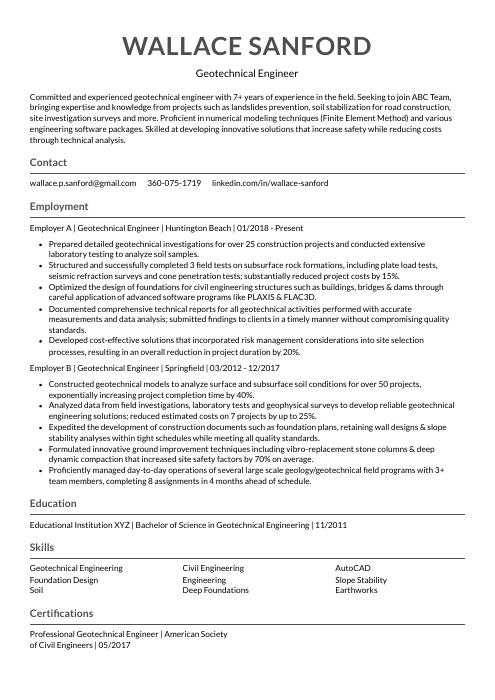 Indri
Indri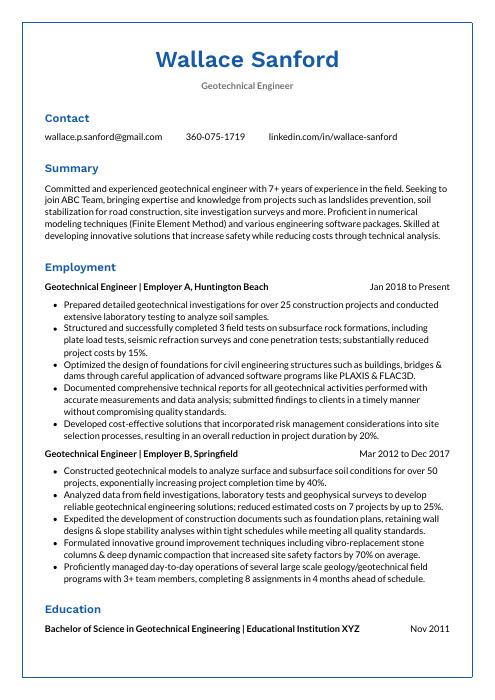 Markhor
Markhor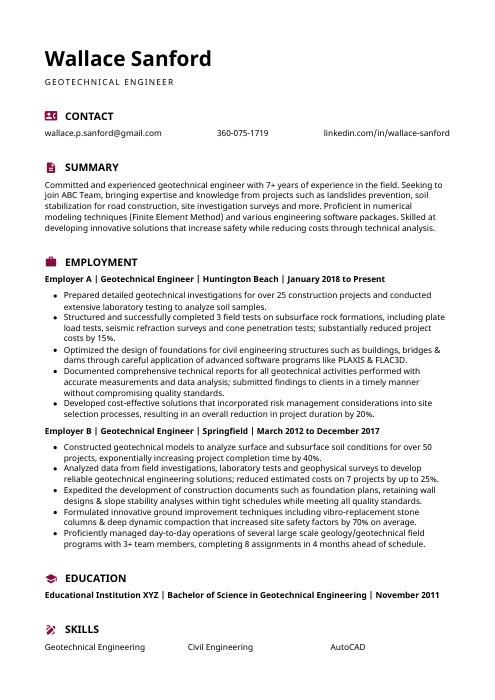 Hoopoe
Hoopoe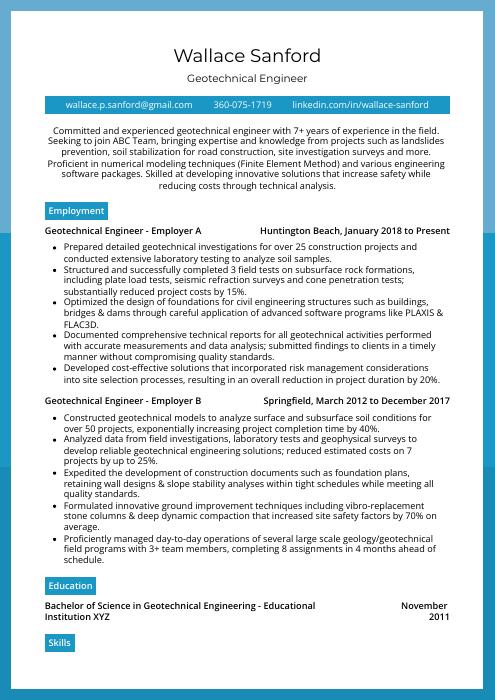 Rhea
Rhea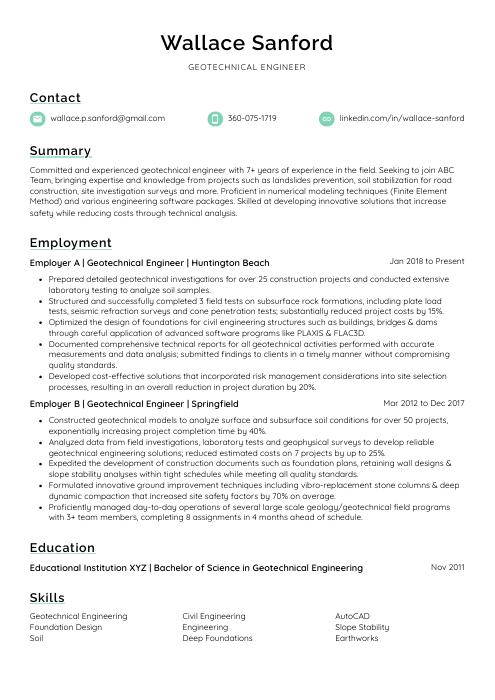 Lorikeet
Lorikeet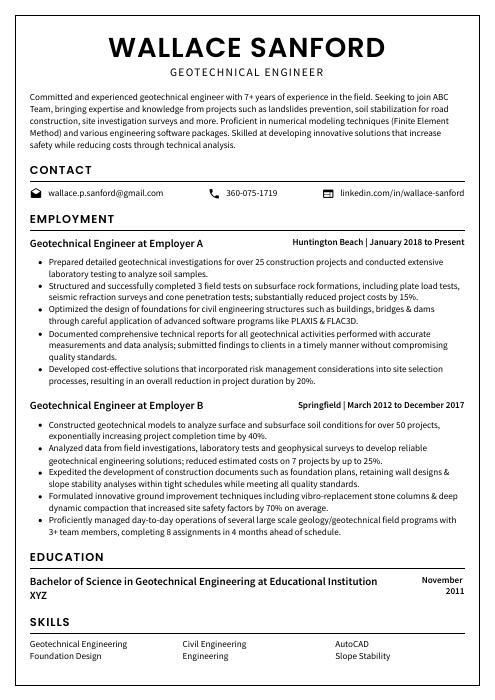 Cormorant
Cormorant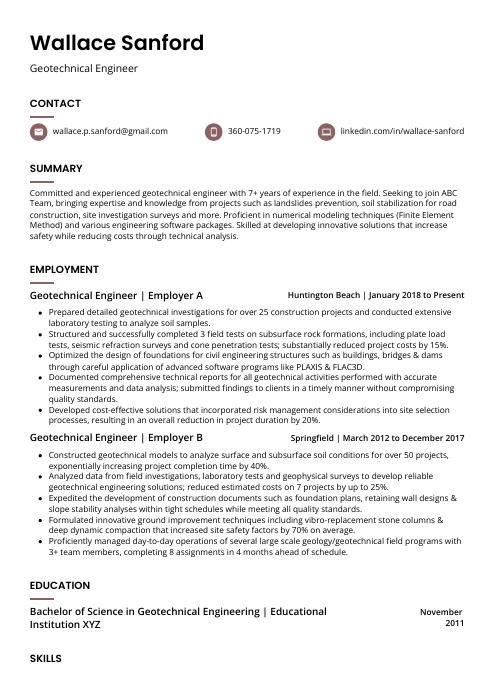 Fossa
Fossa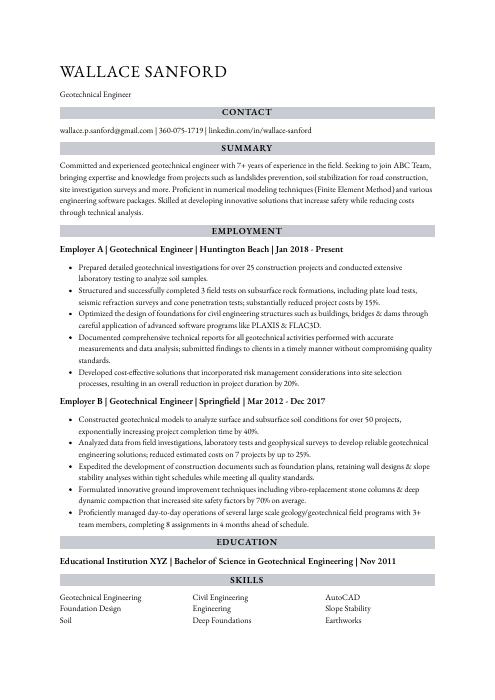 Numbat
Numbat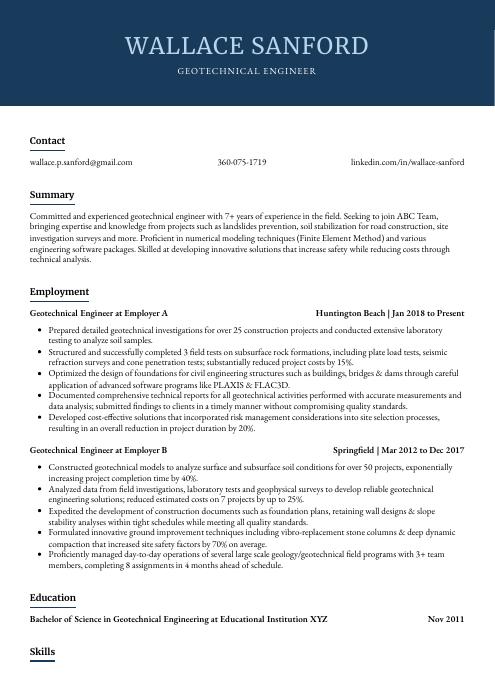 Bonobo
Bonobo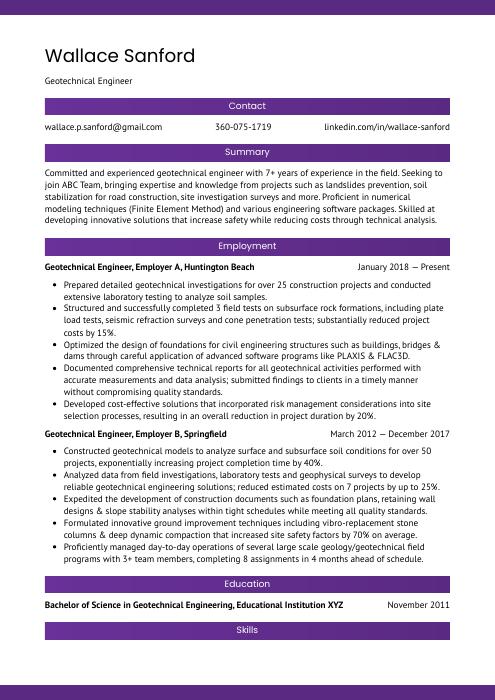 Jerboa
Jerboa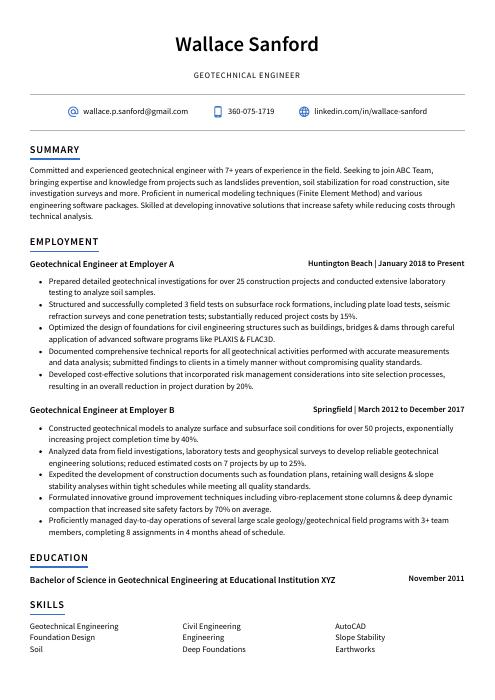 Axolotl
Axolotl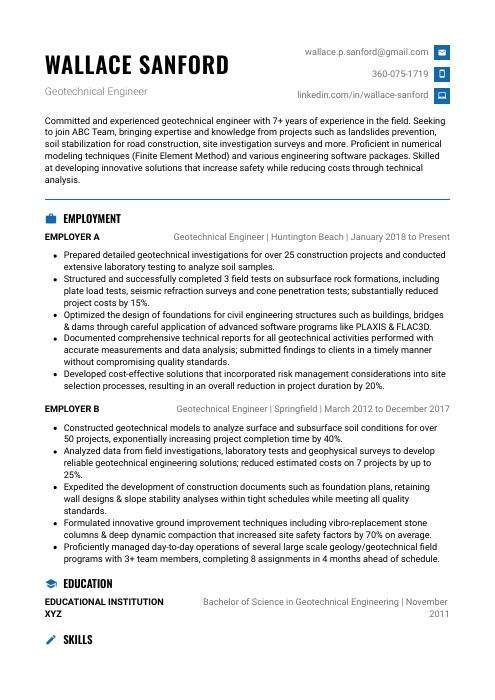 Echidna
Echidna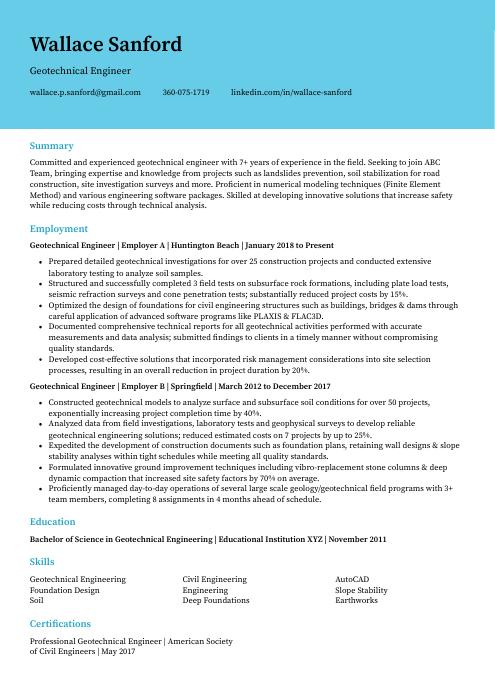 Dugong
Dugong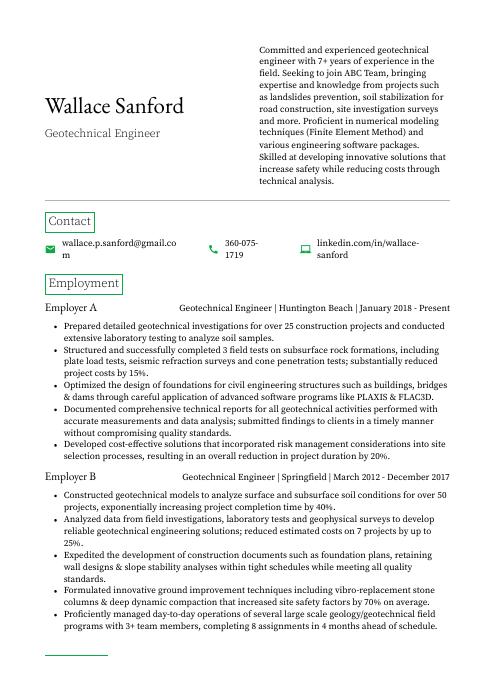 Quokka
Quokka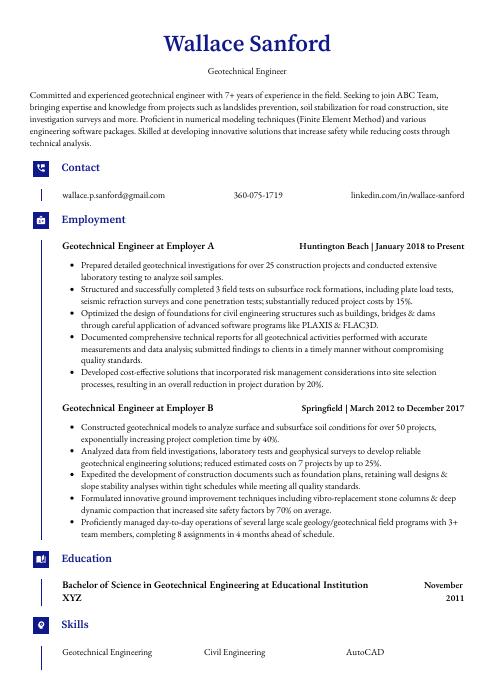 Gharial
Gharial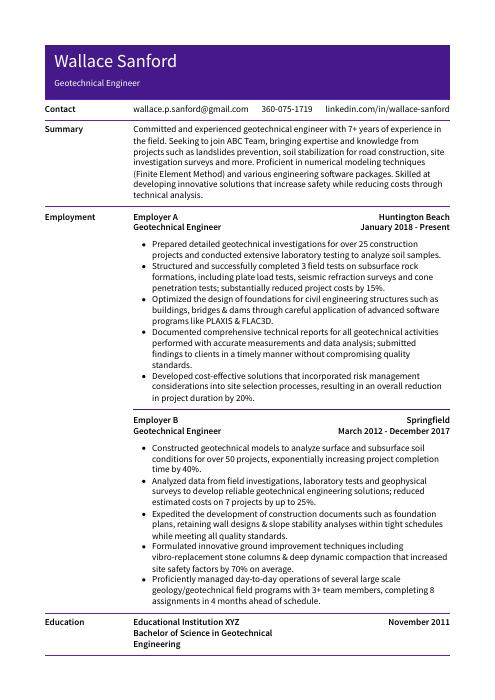 Pika
Pika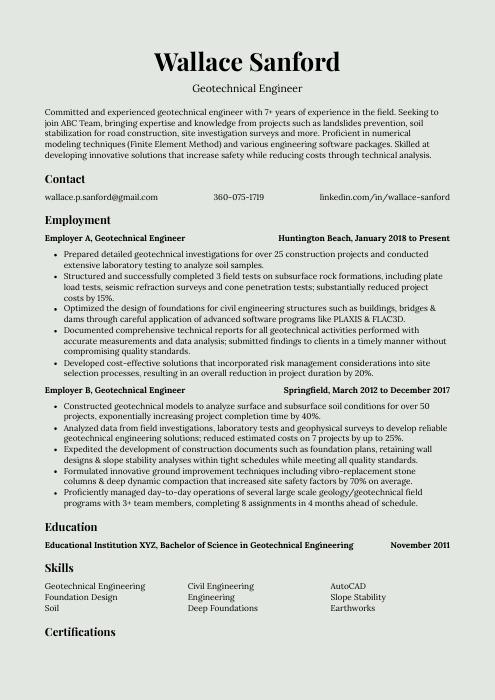 Saola
Saola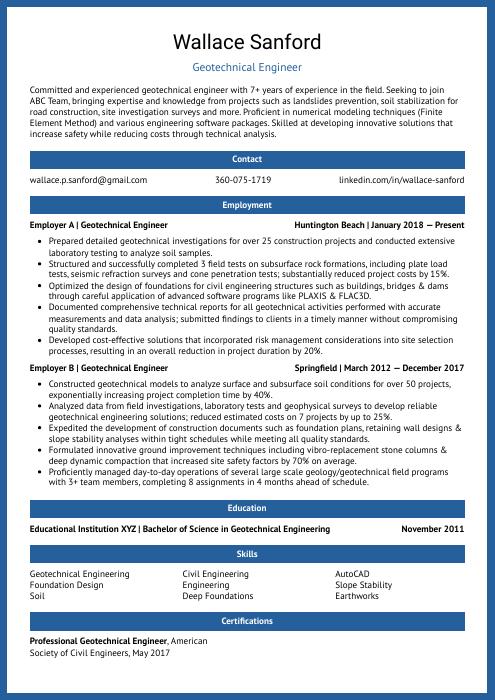 Ocelot
Ocelot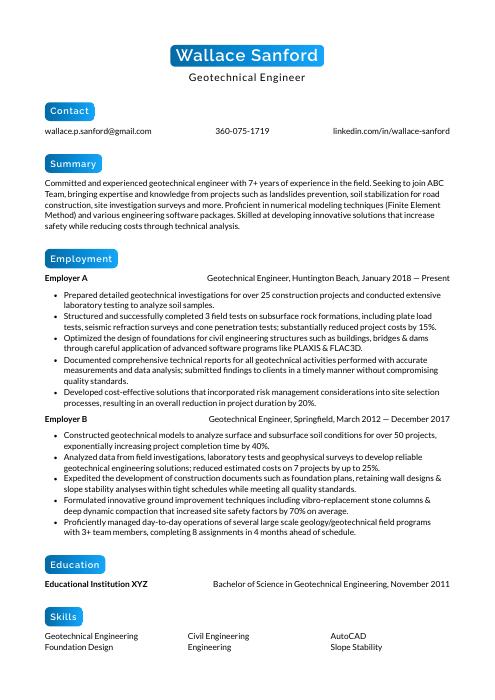 Kinkajou
Kinkajou Rezjumei
Rezjumei
